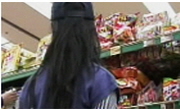The purpose of this research is to examine the effect of affective benefit congruity, affect intensity, and product category on advertising attitude and brand attitude. The results showed that in the case of ad attitude, firstly consumer with high aff...
http://chineseinput.net/에서 pinyin(병음)방식으로 중국어를 변환할 수 있습니다.
변환된 중국어를 복사하여 사용하시면 됩니다.
- 中文 을 입력하시려면 zhongwen을 입력하시고 space를누르시면됩니다.
- 北京 을 입력하시려면 beijing을 입력하시고 space를 누르시면 됩니다.

감정편익 일치성, 감정강도 및 제품 범주가 광고태도와 상표태도에 미치는 영향 = The Effects of affective Benefit Congruity, Affect Intensity, and Product Category on Advertising Attitude and Brand Attitude
한글로보기https://www.riss.kr/link?id=A103971274
- 저자
- 발행기관
- 학술지명
- 권호사항
-
발행연도
2006
-
작성언어
-
-
주제어
affective benefit congruity ; affect intensity ; product category ; advertising attitude ; brand attitude ; 감정편익일치성 ; 감정강도 ; 제품범주 ; 광고태도 ; 상표태도소비자는 다양한 감정을 경험한다. 이러한 감정경험은 광고를 보거나 제품을 구매하는 현장에서도 나타날 수 있고 ; 제품을 소비하는 과정에서도 발생할 수 있다. 예를 들어 ; 식품 ; 음료 ; 화장품 등은 소비자의 감정반응이 특히 중요한 제품들인데 ; 이는 이 제품들이 감정과 밀접한 감각자극들을 제공하기 때문이다. 그리고 어떤 상표는 감정차원으로 제품을 위치화 하는데 ; 일례로 롯데칠성음료인 ‘투인 러 ; affective benefit congruity ; affect intensity ; product category ; advertising attitude ; brand attitude
-
등재정보
KCI등재
-
자료형태
학술저널
- 발행기관 URL
-
수록면
331-349(19쪽)
-
KCI 피인용횟수
9
- 제공처
- 소장기관
-
0
상세조회 -
0
다운로드
부가정보
다국어 초록 (Multilingual Abstract)
The purpose of this research is to examine the effect of affective benefit congruity, affect intensity, and product category on advertising attitude and brand attitude. The results showed that in the case of ad attitude, firstly consumer with high affect intensity had a more favorable ad attitude when the affective benefits from the ad were congruent. Secondly, according to product category, the effect of affective benefit congruity on ad attitude was not significant. In the case of brand attitude, firstly, consumer with high affect intensity had a more favorable brand attitude when the affective benefits from the ad were congruent. Secondly, for utilitarian goods the effect of affective benefit congruity was not significant, however, for hedonic goods, the brand attitude when affective benefits were congruent was more favorable than when the affective benefits were not congruent. The results imply that ad marketers have to consider the affective benefit congruity, the individual difference of affect intensity, and product category for an affective advertising.
국문 초록 (Abstract)
본 연구는 인간의 감정을 중심으로 감정편익일치성, 감정강도, 제품범주 등이 광고태도와 상표태도에 미치는 영향을 살펴보았다. 감정편익이란 제품과 함께 연상되고 기대되는 감정적 경험...
본 연구는 인간의 감정을 중심으로 감정편익일치성, 감정강도, 제품범주 등이 광고태도와 상표태도에 미치는 영향을 살펴보았다. 감정편익이란 제품과 함께 연상되고 기대되는 감정적 경험 또는 소비자가 제품을 구매하거나 사용할 때 소비자가 감정적으로 느낄 수 있는 기대편익을 말한다. 실험결과, 광고태도의 경우 감정강도가 높은 소비자들은 낮은 소비자들에 비해 광고에서 주어지는 감정편익이 일치할 때 광고태도가 호의적이었다. 상표태도의 경우 감정강도가 높은 소비자들은 낮은 소비자들에 비해 감정편익이 일치할 때 상표태도가 호의적이었다. 그리고 실용재의 경우 감정편익일치성에 따른 유의한 효과는 없었지만, 쾌락재의 경우 감정편익이 불일치할 때보다 일치할 때 상표태도가 호의적이었다. 연구결과들은 감정광고에서 감정편익일치성, 감정강도, 제품범주에 따라 광고효과가 달리 나타남을 보여주었다.
참고문헌 (Reference)
1 안종욱, "이 광고의 성공전략: 동서식품 맥심" (266) : 84-88, 2003
2 홍나현, "소비자 혜택에 따른 브랜드 연상요인에 관한 연구" 한국외국어대학교 2002
3 안광호, "브랜드 파워. 한국언론자료간행회"
4 양윤, "무드와 제품범주에 따른 다양성 추구행동과 무드와 다양성 추구경향성에 따른 정보탐색 행동" 13 (13): 71-102, 2002
5 이학식, "광고효과의 조절변수로서 인지욕구와 감성강도의 평가" 13 (13): 105-131, 1998
6 황병일, "광고에서 감정의 역할 사고" 13 : 67-87, 2000
7 김완석, "광고심리학" 서울: 학지사 2000
8 양윤, "감정강도와 인지욕구가 광고⋅상표태도에 미치는 영향: 여대생을 중심으로" 48 : 79-99, 2000
9 Aaker, D. A, "What mediates the emotional response to advertising? The case of warmth. In Cognitive and affective responses to advertising" Lexington, MA: Lexington 1989
10 Larsen, R. J., "Theory and mesurement of affect intensity as an individual differences characteristic" unpublished doctoral dissertation, Department of psychology, University of Illinois, Champaign, IL 61620 1984
1 안종욱, "이 광고의 성공전략: 동서식품 맥심" (266) : 84-88, 2003
2 홍나현, "소비자 혜택에 따른 브랜드 연상요인에 관한 연구" 한국외국어대학교 2002
3 안광호, "브랜드 파워. 한국언론자료간행회"
4 양윤, "무드와 제품범주에 따른 다양성 추구행동과 무드와 다양성 추구경향성에 따른 정보탐색 행동" 13 (13): 71-102, 2002
5 이학식, "광고효과의 조절변수로서 인지욕구와 감성강도의 평가" 13 (13): 105-131, 1998
6 황병일, "광고에서 감정의 역할 사고" 13 : 67-87, 2000
7 김완석, "광고심리학" 서울: 학지사 2000
8 양윤, "감정강도와 인지욕구가 광고⋅상표태도에 미치는 영향: 여대생을 중심으로" 48 : 79-99, 2000
9 Aaker, D. A, "What mediates the emotional response to advertising? The case of warmth. In Cognitive and affective responses to advertising" Lexington, MA: Lexington 1989
10 Larsen, R. J., "Theory and mesurement of affect intensity as an individual differences characteristic" unpublished doctoral dissertation, Department of psychology, University of Illinois, Champaign, IL 61620 1984
11 Edell, J. A, "The power of feeling in understanding advertising effects" 14 : 421-433, 1987
12 Holbrook, M. B, "The experiential aspects of consumption: Consumer fantasies, feeling, and fun" 9 : 132-140, 1982
13 Conway, M. A, "Situational knowledge and emotion" 1 : 145-191, 1987
14 Ellsworth, P. C, "Shades of joy: Patterns of appraisal differentiating pleasant emotions" 2 : 301-331, 1988
15 Ruth, A. J., "Promoting a brand's emotion benefits: The influence of emotion categorization processes on consumer evaluations" 11 (11): 99-113, 2001
16 Smith, C. A, "Patterns of cognitive appraisal in emotion" 48 : 813-838, 1985
17 Bazerman, M. H, "Negotiation with yourself and losing: Understanding and managing conflicting internal preferences" 23 : 224-241, 1998
18 Ellsworth, P. C, "From appraisal to emotion: Differences among unpleasant feelings" 12 : 271-302, 1988
19 Rosch, E, "Family resemblance: Studies in the internal structure of categories" 7 : 573-605, 1975
20 Shaver, P, "Emotion knowledge: Further explanation of a prototype approach" 52 : 1061-1086, 1987
21 Strahilevits, M. A, "Donations to charity as purchase incentives: How well they work may depend on what you are trying to sell" 24 : 434-446, 1998
22 Sujan, M, "Consumer knowledge: Effects on evaluation strategies mediating consumer judgements" 12 : 31-46, 1985
23 Dhar, R., "Consumer choice between hedonic and utilitarian goods" 37 : 60-71, 2000
24 Buck, R, "Conceptualizing and operationalizing affect, reason and involvement in persuasion: The ARI Model" 22 : 440-447, 1995
25 Rosch, E., "Cognitive representation of semantic categories" 104 : 192-233, 1975
26 Larsen, R. J, "Cognitive operations associated with individual differences in affect intensity" 53 : 767-774, 1987
27 Petty, R. E, "Central and peripheral routes to advertising effectiveness: The moderating role of involvement" 10 : 135-146, 1983
28 Aaker, D. A, "Building strong brand" the Free Press 1996
29 Rosch, E, "Basic objects in nature categories" 8 : 382-439, 1976
30 Holbrook, M. B, "Assessing the role of emotions as mediators of consumer responses to advertising" 14 : 404-420, 1987
31 Mano, H, "Assessing the dimensionality and structure of the consumption experience: Evaluation, feeling, and satisfaction" 20 : 451-466, 1993
32 Batra, R, "Affective responses mediating acceptance of advertising" 13 : 234-249, 1986
33 Moore, D. J, "Affect intensity: An individual difference response to advertising appeal" 22 : 154-164, 1995
34 Larsen, R. J, "Affect intensity as an individual difference characteristic: A review" 21 (21): 1-39, 1987
35 Moore, D. J, "Affect intensity and the consumer's attitude toward high impact emotional advertising appeals" XXV (XXV): 37-47, 1996
36 Larsen, R. J, "Affect intensity and reactions to daily life events" 51 (51): 803-814, 1986
동일학술지(권/호) 다른 논문
-
- 한국소비자·광고심리학회
- 김완석
- 2006
- KCI등재
-
The Impact of Country-of-Origin on Implicit Attitudes and Beliefs of Consumers
- 한국소비자·광고심리학회
- Seung Yun Lee
- 2006
- KCI등재
-
광고 혼잡도와 웹 콘텐츠 관여도에 따른 인터넷 배너광고의 기억효과에 관한 연구
- 한국소비자·광고심리학회
- 홍종필
- 2006
- KCI등재
-
- 한국소비자·광고심리학회
- 김철민
- 2006
- KCI등재
분석정보
인용정보 인용지수 설명보기
학술지 이력
| 연월일 | 이력구분 | 이력상세 | 등재구분 |
|---|---|---|---|
| 2027 | 평가예정 | 재인증평가 신청대상 (재인증) | |
| 2021-01-01 | 평가 | 등재학술지 유지 (재인증) |  |
| 2018-01-01 | 평가 | 등재학술지 유지 (등재유지) |  |
| 2015-01-01 | 평가 | 등재학술지 유지 (등재유지) |  |
| 2011-01-01 | 평가 | 등재학술지 유지 (등재유지) |  |
| 2009-01-01 | 평가 | 등재학술지 유지 (등재유지) |  |
| 2006-01-01 | 평가 | 등재학술지 선정 (등재후보2차) |  |
| 2005-05-30 | 학술지명변경 | 한글명 : 한국심리학회지: 소비자/광고 -> 한국심리학회지: 소비자·광고 |  |
| 2005-01-01 | 평가 | 등재후보 1차 PASS (등재후보1차) |  |
| 2003-01-01 | 평가 | 등재후보학술지 선정 (신규평가) |  |
학술지 인용정보
| 기준연도 | WOS-KCI 통합IF(2년) | KCIF(2년) | KCIF(3년) |
|---|---|---|---|
| 2016 | 1.23 | 1.23 | 1.38 |
| KCIF(4년) | KCIF(5년) | 중심성지수(3년) | 즉시성지수 |
| 1.28 | 1.35 | 2.111 | 0.15 |




 KCI
KCI







